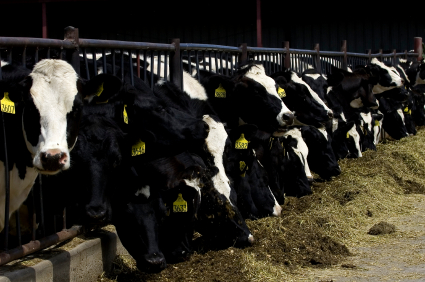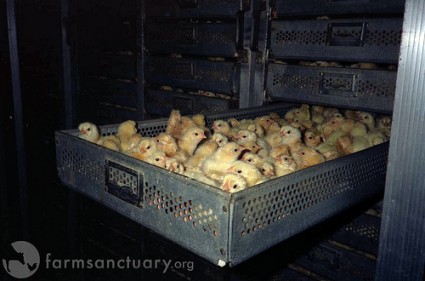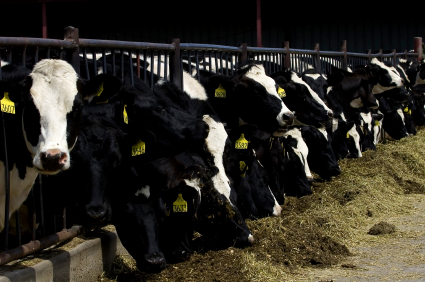 Got milk monopoly?
Got milk monopoly?
UPDATE: Ask and ye shall receive. In a NYT article last Saturday, describing the considerable resistance anti-trust chief Christine Varney is already experiencing in her attempt to toughen enforcement, came this nugget:
At the request of some lawmakers, notably Senator Bernard Sanders, independent of Vermont, Ms. Varney is examining whether small agricultural operations are being hampered unfairly by large food processors, particularly in the milk industry, congressional aides said.
Not much to go on, but at least they’re looking at the problem — and possibly looking beyond dairy, which would be interesting indeed. The article doesn’t provide any more details — most of it describes the split within the administration itself over anti-trust issues involving the transportation and communication industries. It’s worth watching to see what happens when Big Food’s administration allies mobilize over anything Ms. Varney cooks up. Still, at least she’s paying attention.
__________________________________________________________________________________
Earlier this year, the Obama adiministration’s top antitrust enforcer, Christine Varney, announced a new effort to crack down on monopolist practices in industry. Some of us were particularly interested to observe that Varney’s first speech specifically mentioned agribusiness as a top target. This is understandable since, from fertilizer to meatpacking to seeds, four companies or fewer control up to 80% of each of these markets.
But right now nowhere are the oligolopolists doing more damage than in the dairy industry, where prices have fallen faster and deeper than any time since the Great Depression. And now, joining ranks with tens of thousands of desperately struggling dairy farmers, Sen. Bernie Sanders of Vermont has had enough — he has called on the Justice Department to investigate the dairy giant Dean Foods as a monopolist.
It’s about time someone in government used that word to describe Dean Foods. They control 40% of the fluid milk supply nationwide and, to Sen. Sanders’ great dismay, almost 70% of fluid milk in New England. But surely, with milk prices scraping the bottom, they must be suffering as well. Nope.
At the end of 2008, Dean Foods reported adjusted quarterly operating income of $184m, the highest in its history.
…While Dean Foods continues to increase its profits, milk prices have taken a tumble. At a press conference in his offices, Sanders said: “Farmers have seen the price for their milk drop from $19.50 per hundred pounds a year ago to less than $11 in June. Meanwhile, Dean Foods’ profits climbed from $30m in the first quarter of 2008 to $76.2m for the first quarter of 2009.”
Dean Foods, of course, denies the accusations of monopoly and points out that milk prices are regulated by the government. This is true. What Dean Foods doesn’t mention is that a relatively recent reform allowed the “government-set” milk price to be determined by the price of milk on the Chicago Mercantile Exchange. So really, the government punted to the commodities market — and it’s been a fun ride, hasn’t it?
Markets, after all, are always right and never subject to manipulation. That was why everyone was so shocked when the Dairy Farmers of America — another effective monopolist that controls 40% of the nation’s dairy production — was fined $12 million dollars and was barred from the exchange by the government for price fixing. And they weren’t, mind you, trying to fix a higher price for milk. In essence, wholesale milk pricing has been privatized, while the store price for milk remains regulated by state and regional compacts — with companies like Dean Foods profiting lavishly on the spread.
That, my friends, is capitalism at work.
So, when Secretary of Agriculture Tom Vilsack visits rural areas he is often met, as he was the other day in Wisconsin, by protesting dairy farmers. Meanwhile his response, and the response of the administration generally, continues to be anemic. Some emergency money has been distributed — but suffice it to say that these efforts amount to no more than sticking fingers in a crumbling dike.
The government inertia over the dairy crisis is due, in large part, because the administration agrees with Big Ag that consolidation in agriculture is inevitable — even a benefit to society. Consolidation leads to lower prices — which appears to be the only wholeheartedly embraced goal of the USDA. But the flip side to that embrace is that lower prices lead to more consolidation — and eventually there will be only a handful of corporations producing (or importing) most of our milk. To be honest, Vilsack, and even Obama, verge on hypocrisy when they decry rural depopulation and economic collapse while they endorse — tacitly or not — this continued consolidation in agriculture.
With the administration unwilling to use existing authority under the law to step in and adjust the price of milk or to look into the mass importation of dried milk products from overseas — as many have called on it to do — the very least it could do would be to support Sen. Sanders call for anti-trust action against Dean Foods. Doing so would finally put a bit of real muscle behind Obama’s “rural agenda.” Ms. Varney — it’s your move.
h/t GastroNomolies




